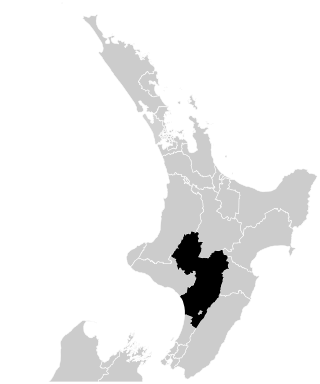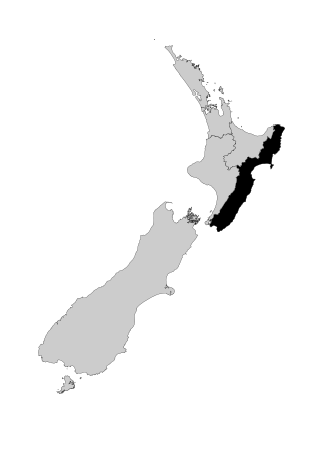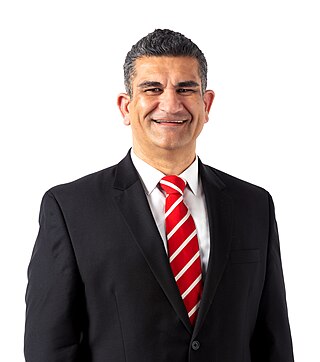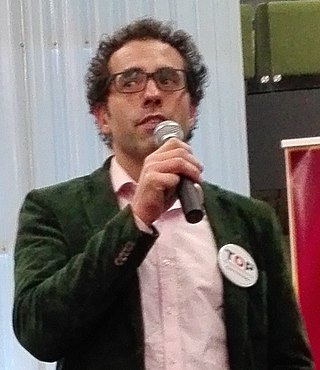
Christchurch Central is a New Zealand parliamentary electorate in the South Island city of Christchurch. The electorate was established for the 1946 election and, until 2011 had always been won by the Labour Party. Since 2008, the incumbent was Brendon Burns but the election night results for the 2011 election resulted in a tie; the special vote results combined with a judicial recount revealed a 47-vote majority for Nicky Wagner, the National list MP based in the electorate. Wagner significantly increased her winning margin in the 2014 election after having declared the electorate "unwinnable" for National earlier in the year following a boundary review. At the 2017 election Wagner lost the seat to Labour's Duncan Webb, who retained it at the 2020 election.

Coromandel is a New Zealand electoral division returning one member to the House of Representatives. It is currently represented by Scott Simpson, a member of the National Party.

Ilam is a New Zealand parliamentary electorate. Formed for the 1996 election, it was held by Gerry Brownlee of the National Party until the 2020 election, when Sarah Pallett of the Labour Party unseated Brownlee in an upset victory. The seat reverted to National when it was won by Hamish Campbell in the 2023 election.

Mana is a New Zealand parliamentary electorate in the Wellington metropolitan area. It has been held by Barbara Edmonds of the Labour Party since the 2020 election.

Napier is a New Zealand parliamentary electorate, returning one Member of Parliament to the House of Representatives. It is named after the city of Napier, the main urban area within the electorate. The electorate was established for the 1861 election and has existed since. It has been held by Katie Nimon of the New Zealand National Party since the 2023 general election. It was held by Stuart Nash of the New Zealand Labour Party from the 2014 general election until 2023, when he did not stand for re-election.

New Lynn is a New Zealand parliamentary electorate, returning one member to the New Zealand House of Representatives. Deborah Russell of the Labour Party represented the electorate from the 2017 general election before being defeated by National's Paulo Garcia in the 2023 election.

Rangitīkei is a New Zealand parliamentary electorate, returning one Member of Parliament to the New Zealand House of Representatives. The current MP for Rangitīkei is Suze Redmayne of the National Party. She has held this position since 2023.

Rongotai is a New Zealand electorate, returning a single member to the New Zealand House of Representatives. The current MP for Rongotai is Julie Anne Genter of the Green Party. She has held this position since the 2023 general election.

Whangārei is a New Zealand parliamentary electorate that was first created for the 1972 election. The electorate is usually a reasonably safe National seat, and was held for long periods by John Banks (1981–1999) and Phil Heatley (1999–2014), before being won in the 2014 election by Shane Reti. In the 2020 election Reti narrowly lost the seat to Labour's Emily Henderson. Reti would reclaim the seat at the 2023 election with a huge majority.

Te Tai Tonga is a New Zealand parliamentary Māori electorate, returning one Member of Parliament to the New Zealand House of Representatives. It was established for the 1996 general election, replacing Southern Maori. It covers all of the South Island, Stewart Island, the Chatham Islands, and parts of both Wellington City and the Hutt Valley. The current MP for Te Tai Tonga is Tākuta Ferris of Te Pāti Māori.

Wellington Central is an electorate, represented by a Member of Parliament in the New Zealand House of Representatives. The current MP for Wellington Central is Tamatha Paul of the Green Party. She has held this position since the 2023 general election.

Ikaroa-Rāwhiti is a New Zealand parliamentary Māori electorate that was formed for the 1999 election. It covers the eastern North Island from East Cape south through Hawke's Bay and the Wairarapa to Wainuiomata and most of the Hutt Valley, but not southern Lower Hutt or Wellington City.

Rangitata is an electorate in the South Island of New Zealand. It first existed for two parliamentary terms in the late 19th century and was re-established for the 2008 general election. It largely replaced the Aoraki electorate, but included parts of the Rakaia electorate as well.

The 2014 New Zealand general election took place on Saturday 20 September 2014 to determine the membership of the 51st New Zealand Parliament.

Tahere Paul Eagle is a New Zealand politician and former member of the New Zealand House of Representatives for the Rongotai electorate from 2017 to 2023. He was a Wellington City Councillor from 2010 to 2017 and was the first person of Māori descent to be Deputy Mayor of Wellington, but was defeated in a landslide when he sought the mayoralty as an independent candidate in 2022.

The Opportunities Party is a centrist political party in New Zealand. It was founded in 2016 by economist and philanthropist Gareth Morgan. The party is based on the idea of evidence-based policy, with some 2023 policies including achieving a “fair tax system” by implementing a "tax switch" and implementing the "Teal Card" for young people, as well as specific investments for the city of Christchurch.

The 2018 Opportunities Party leadership election was held in New Zealand in December 2018 to determine the future leadership of The Opportunities Party (TOP) political party. The election was won by previous deputy leader Geoff Simmons.

The Integrity Party of Aotearoa New Zealand (TIPANZ) was an unregistered political party in New Zealand. It was a progressive-centrist party, with an ideology of Hauora (well-being), equality, and integrity. It was led by Helen Cartwright with Troy Mihaka as deputy.

Jessica Hammond is a New Zealand public servant, perennial candidate, playwright, and blogger. Hammond stood for The Opportunities Party for Ōhāriu in the 2017, 2020, and 2023 general elections, coming third twice and fourth once.

Shai Navot is a New Zealand lawyer, former crown prosecutor, and leader of The Opportunities Party (TOP) between 2020 and 2022. She previously served as deputy leader of The Opportunities Party during the 2020 election.




















